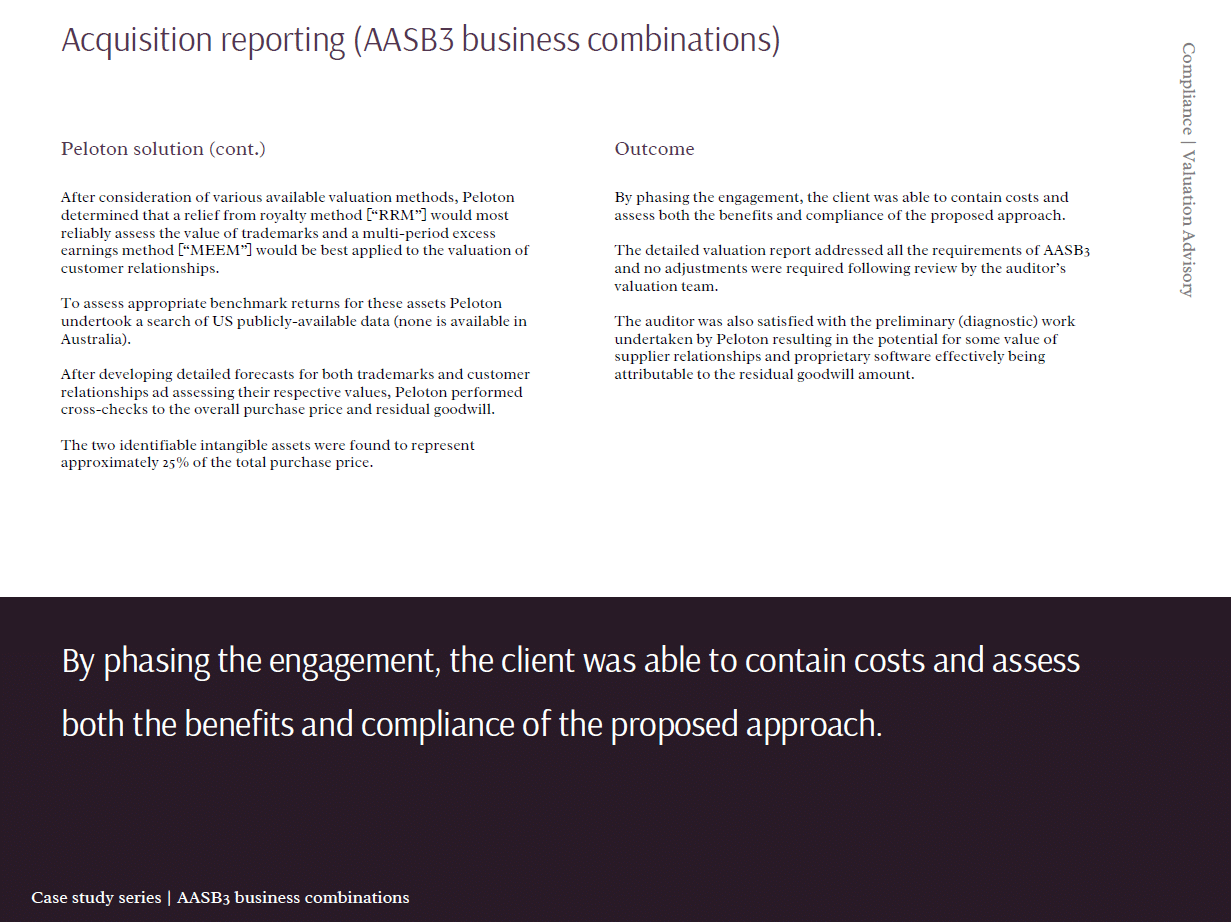The need for acquisition reporting
An unlisted public company involved in the fast-moving consumer goods industry acquired a strategically-significant company and required a purchase price allocation to comply with AASB3 Business Combinations.
The acquired company had been operating for over twenty years, was profitable and had developed a strong competitive position in its target market.
From the due diligence undertaken by the client it appeared likely that the acquisition included certain identifiable intangible assets requiring detailed valuation consideration.
Valuation issues and considerations
AASB3 requires application of the fair value definition and consideration of both AASB136 Impairment Testing and AASB138 Intangible Assets.
A key issue is whether an identifiable intangible asset is capable of separation or contractually generates objectively-measurable economic benefits.
From a review of the acquisition documentation (the vendor data room had been saved by the purchaser) it became apparent that there were four potential identifiable intangible assets:
- Trademarks
- Customer relationships
- Supplier contracts and relationships
- Software and technology
A key issue is whether an identifiable intangible asset is capable of separation or contractually generates objectively-measurable economic benefits.
Key issues for consideration included:
- The impact on profitability of each identifiable intangible asset
- The extent to which the acquired company controlled the economic benefits expected to arise (including consideration of the separation and contractual benefit tests)
- The likely life of any identifiable intangible asset
- Potential tax amortisation benefits which might arise from recognition under the tax consolidation joining entity rules
Peloton solution
Peloton proposed a two phase engagement reflective of the uncertainty as to the existence ad materiality of the potential identifiable intangible assets:
A diagnostic phase focussed on identification of identifiable intangible assets and initial assessment of potential value
A detailed valuation analysis and reporting as to value of the identified intangible assets
The diagnostic phase revealed that, whilst supplier contracts and proprietary software clearly existed, the economic benefit expected to be derived from these identifiable intangible assets was unlikely to be of material value.
Consequently, the detailed valuation analysis phase of the engagement focussed on the customer relationships and trademarks (any value attaching to supplier contracts ad proprietary software essentially fell to the residual goodwill amount).
After consideration of various available valuation methods, Peloton determined that a relief from royalty method [“RRM”] would most reliably assess the value of trademarks and a multi-period excess earnings method [“MEEM”] would be best applied to the valuation of customer relationships.
To assess appropriate benchmark returns for these assets Peloton undertook a search of US publicly-available data (none is available in Australia).
After developing detailed forecasts for both trademarks and customer relationships ad assessing their respective values, Peloton performed cross-checks to the overall purchase price and residual goodwill.
The two identifiable intangible assets were found to represent approximately 25% of the total purchase price.
Outcome
By phasing the engagement, the client was able to contain costs and assess both the benefits and compliance of the proposed approach.
The detailed valuation report addressed all the requirements of AASB3 and no adjustments were required following review by the auditor’s valuation team.
The auditor was also satisfied with the preliminary (diagnostic) work undertaken by Peloton resulting in the potential for some value of supplier relationships and proprietary software effectively being attributable to the residual goodwill amount.
